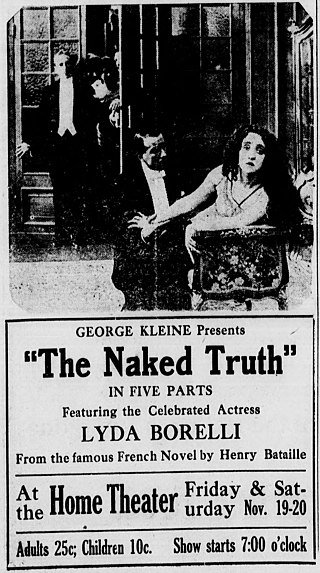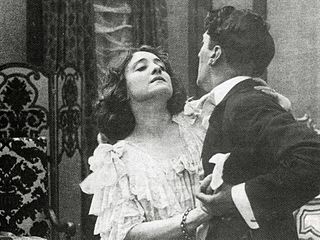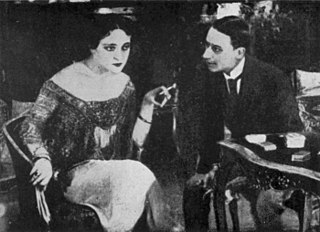
Francesca Bertini was an Italian silent film actress. She was one of the most successful silent film stars in the first quarter of the twentieth-century.

Isa Miranda was an Italian actress with an international film career.

Tullio Carminati was an Italian actor.

Carmine Gallone was an early Italian film director, screenwriter, and film producer, who was also controversial for his works of pro-Fascist propaganda and historical revisionism. Considered one of Italian cinema's leading early directors, he directed over 120 films in his fifty-year career between 1913 and 1963.

Lyda Cini, Countess of Monselice was an Italian actress of cinema and theatre. Her career in theatre started when she was a child, acting on stage with Paola Pezzaglia in the French drama I due derelitti.

Enzo Biliotti was an Italian film actor. He appeared in 80 films between 1916 and 1958..

Thaïs is a 1917 Italian silent film directed by Anton Giulio Bragaglia. The movie is the sole surviving Italian Futurist film, and currently kept at the Cinémathèque Française. It is not based on the novel of the same name by Anatole France.

Giuseppa Iolanda Menichelli, known professionally as Pina Menichelli, was an Italian actress. After a career in theatre and a series of small film roles, Menichelli was launched as a film star when Giovanni Pastrone gave her the lead role in The Fire (1916). Over the next nine years, Menichelli made a series of films, often trading on her image as a diva and on her passionate, decadent eroticism. Menichelli became a global star, and one of the most appreciated actresses in Italian cinema, before her retirement in 1924, aged 34.

The Naked Truth is a 1914 silent Italian drama film directed by Carmine Gallone.

Flower of Evil is a 1915 silent Italian drama film directed by Carmine Gallone. The film was shown as part of the Silent Divas of the Italian Cinema programme at the 38th New York Film Festival in 2000.

La falena is a 1916 silent Italian drama film directed by Carmine Gallone. The film is considered to be lost, with only a fragment surviving in the film archive of the Cineteca Italiana.
The Thirteenth Man is a 1917 silent Italian drama film directed by Carmine Gallone.
La storia di un peccato is a 1918 silent Italian drama film based on the novel by Polish writer Stefan Żeromski of the same title directed by Carmine Gallone.
A Doll Wife is a 1919 silent Italian drama film directed by Carmine Gallone. The film was shown as part of the Silent Divas of the Italian Cinema programme at the 38th New York Film Festival in 2000.

Malombra is a 1942 Italian drama film directed by Mario Soldati and starring Isa Miranda, Andrea Checchi and Irasema Dilián. It is based on the novel Malombra by Antonio Fogazzaro, which had previously been adapted into a 1917 silent film of the same title. It was made at Cinecittà with sets designed by Gino Brosio. It was produced by Riccardo Gualino's Lux Film. It belongs to the movies of the calligrafismo style.

Love Everlasting is a 1913 Italian silent drama film directed by Mario Caserini and starring Lyda Borelli, Mario Bonnard and Gianpaolo Rosmino. With the possible exception of Cabiria (1914), it is the most famous of early Italian silent films. It was made in Turin by Gloria Film. Borelli's appearance in the film led to her being considered the first diva of the cinema.

Il mostro di Frankenstein is a 1921 Italian silent film directed by Eugenio Testa. The film features actor Luciano Albertini as Baron von Frankenstein and Umberto Guarracino as The Monster. Albertini was known for his strong-man films at the time, particularly the Sansone film series. The film is a lost film, with only a photo, some promotional materials, and a single published review left to give insight to what the film was.
Malombra is a 1974 Italian television series. It is an adaptation of the 1881 gothic novel Malombra by Antonio Fogazzaro, which has also been made into several films. It aired on Rai 1 in four 60 minutes episodes.

Rapsodia Satanica is a 1915 Italian silent film directed by Nino Oxilia featuring Lyda Borelli in a female version of Faust based on poems by Fausto Maria Martini. Pietro Mascagni wrote his only film music for the film and conducted the first performance in July 1917. Mascagni was keen to take commission for the film music due to the financial burden of supporting two sickening brothers.

Nostos: The Return is a 1989 Italian adventure drama film directed by Franco Piavoli, starring Luigi Mezzanotte and Branca De Camargo. Drawing from Homer's Odyssey, the film depicts Odysseus' homeward journey across the Mediterranean Sea following the Trojan War, and his struggles against natural obstacles and inner torments. The film relies on visual storytelling and the portrayal of nature; dialogue is minimal, without subtitles, and spoken in an imaginary Mediterranean language. Nostos: The Return explores themes of homecoming, the memory of war, time, and man's relationship with nature.
















